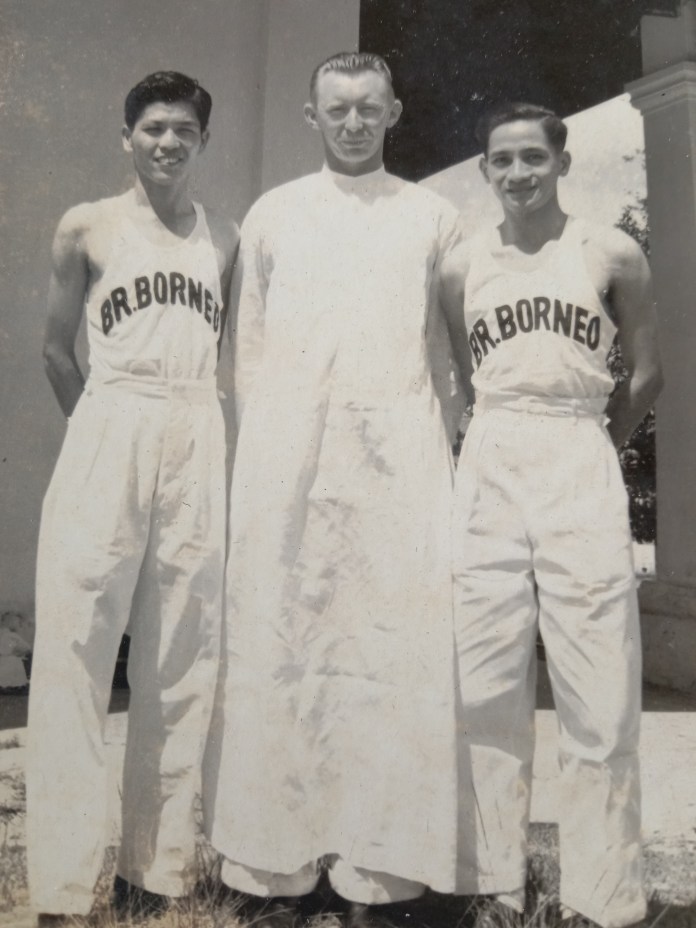
This work is originally published by Cahya Mata Sarawak. DayakDaily is given the permission to share this story within our platforms.
By Martin Yee, Kenny Ee, and Marlynda Meraw
HE spent almost eight decades as an athlete, then became a long-serving sports official, distinguishing himself as one of the locals with the longest involvement in sports in Sarawak.
Born in Miri and raised in Kuala Belait, Brunei, Tham Siew Kai’s early life was marked by both hardship and adventure. During the Japanese occupation, at the tender age of 11, he escaped the invasion with his family, sneaking away by boat at night to Labi, Brunei. This chapter of survival would later echo in his sporting career—where, no matter the obstacles, he would always push forward, a never-faltering determination of his.
After the war, Siew Kai returned to Miri, studying at St. Joseph’s School in Miri before continuing his education at St. Joseph’s in Kuching. It was here that his athletic journey took shape, nurtured in the heart of a post-war Sarawak where sports became more than just an activity—it was an escape, a pursuit, and ultimately, his calling.
As a young boarder at St. Joseph’s School in Kuching, he found solace on the tracks, filling the hours after class and revision with running. The grass track became his refuge, and Siew Kai’s natural talent began to shine through. His first race, in 1958, would set the tone for a career marked by courage and tenacity.

Competing in a Rotary Club-organised event at the old Sarawak Union Club ground near St. Thomas’ School to commemorate Queen Elizabeth II’s coronation, he found himself bleeding at the starting line after being accidentally stepped on by an opponent’s spiked shoe. Undeterred by the injury, he pushed through the pain and won the race. It was a testament to his resolve—nothing would slow him down.
“I remember that race vividly,” he later recalled. “Despite bleeding from the injury, I continued to run and beat him. In fact, I never lost an 880-yard race in any Sarawak meets.”
This would be the beginning of a remarkable unbeaten streak in the 880-yard race, where Siew Kai ruled the middle-distance events across Sarawak’s meets and the prestigious Borneo Games. No one could rival his strength in the 440-yard and 880-yard, events where his name became synonymous with victory. His dominance in these races carved a legacy that would remain untouched.
In the same year of his very first race, Siew Kai was chosen to be part of Sarawak’s first batch of athletes to compete in the 1958 British Empire Games in Cardiff, Wales. This invitation was more than a personal honour—it was a moment of pride for Sarawak, then a British colony, as the world took its first glimpse of the State’s hidden talents.
The British were very keen on athletics, and Siew Kai was happy to have been invited.
“Getting invited meant you were a special guest of the British government. For us, being there was not only about competing—it was about showing the world that Sarawak existed.”
The Empire Games were more than just a competition; they were a celebration of his journey—a young boy from Miri, who had escaped the throes of war, now running on one of the grandest stages in the world. Though Sarawak was still an unfamiliar name to many, Siew Kai ensured it was known to the world, through the relentless power of his stride.
Siew Kai’s influence on Sarawakian athletics did not end with his retirement from the track. He continued to work tirelessly with the Sarawak Amateur Athletics Association (SAAA), ensuring that the next generation of young athletes had every opportunity to follow in his footsteps.
He helped organise local meets, searching for the raw talent that lay hidden in the youth of Sarawak, just as his own talent had been discovered on the grass tracks of Kuching. Under his leadership, Sarawak’s athletics grew stronger, and his enduring presence became a guiding force in the development of the sport.
For his lifelong service to athletics, Siew Kai was awarded a datukship—the first sports official in Sarawak to be so honoured. It was a recognition of a life dedicated to both the thrill of competition and the quiet, steady work behind the scenes, helping to lift others onto the path he had once run.
Siew Kai’s legacy is more than his victories on the track; it is in the countless lives he touched as a mentor, a leader, and an inspiration. In the annals of Sarawakian sports, his name will forever stand tall, a timeless champion whose love for athletics transcended every finish lines. –DayakDaily









